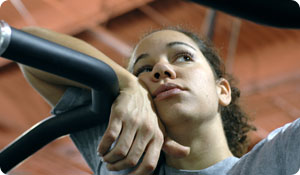
When you head to the gym, do you find that your nasal passages and bronchial tubes seem to get just as much of a strenuous workout as you? The Asthma and Allergy Foundation of America (AAFA) estimates that as many as 80 to 90 percent of people with allergic asthma will experience symptoms when they engage in strenuous exercise.
Allergic Asthma and Exercise
You don't have to give up your fitness routine or steer clear of the gym to guard against the discomfort of allergic asthma. The first step to ensure your workout is allergy- and asthma-free is to identify the wide range of potential dangers that exist and take asthma medications as needed to prevent and control your symptoms.
Common Allergy and Asthma Triggers
Some common allergens that lurk in your gym and trigger allergies and asthma include:
- Latex contained in exercise mats.
- Chlorine and other chemicals used in the pool and sauna.
- Ingredients in protein bars and energy shakes sold at health club snack bars.
- Chemicals and scents in cleaning products.
- Fabrics of your workout attire.
When you encounter some or all of these types of allergens at your health club, they can make exercise-induced asthma symptoms more severe. Some of the common types of discomforts you might experience include coughing, chest tightness or pressure, wheezing, and shortness of breath.
How to Protect Yourself
Once you know the danger zones and how to recognize the signs, experts say that in order to avoid these allergic asthma triggers while exercising, try these simple actions to head off a reaction and keep yourself breathing well:
- Invest in your own latex-free mat for stretching and/or for exercise classes.
- Avoid the pool and sauna areas if you find that chemicals irritate your sensitive respiratory passages.
- Check the ingredients before you eat or drink, especially if you have allergies to peanuts, eggs, soy, or wheat.
- Take an antihistamine before entering the fitness center to prevent a reaction from the fumes contained in the chemicals and cleaning products used to disinfect health club equipment.
- Choose exercise gear carefully. Look for high-quality natural fabrics and steer clear of anything treated with chemicals.
- Use your asthma inhaler as directed before you exercise. (Your doctor can recommend the best medications for your specific situation.)
- Warm up and cool down properly to avoid overtaxing your respiratory system.
- Skip your workout when you're feeling sick.
Choose Well
When your allergic asthma seems to get in the way of your exercise goals, seek out activities that you can tolerate well, such as walking, or team sports. These can be done in short bursts, which can be easier on your respiratory system.
Sources:
"Exercise-Induced Anaphylaxis and Urticaria." American Family Physician. (Oct. 2001) 64(8):1367-1373. Web. 10 Jan. 2011.
"Exercise-Induced Asthma." Allergy and Asthma Foundation of America. AAFA Editorial Board, 2005. Web. 14 Jan. 2011.
"Exercising with Allergies and Asthma." American College of Allergy, Asthma and Immunology. ACAAI, n.d. Web. 9 Jan. 2011.





